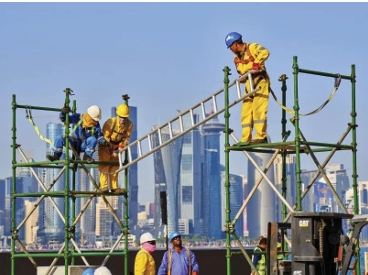NEW DELHI: Numerous complaints from Indian migrant laborers, particularly from Kuwait, highlight issues such as non-payment of salaries, poor working and living conditions, insufficient basic amenities, harassment, and unfair treatment by employers.
A significant number of migrant workers travel to Gulf countries under two-or-three-year labor contracts. Many of them endure deplorable living conditions in overcrowded labor camps. These camps often lack adequate sanitation, basic health facilities, and safe drinking water, resulting in subhuman living conditions.
Numerous complaints from Indian migrant laborers, particularly from Kuwait, highlight issues such as non-payment of salaries, poor working and living conditions, insufficient basic amenities like food and water, harassment, unfair treatment by employers, and difficulties in repatriating the bodies of deceased workers. In many cases, workers’ passports are confiscated upon arrival, leaving them dependent on their employers.
According to a research paper by Shivam Bhattacharya titled “Indian Migrants in Gulf States: A Critical Assessment of Their Issues and Challenges from a Human Rights Perspective,” the socio-economic profile of Indian migrants in Gulf countries is often financially weak, with many selling properties to cover visa and fee costs. These migrants are exploited due to their technical expertise and willingness to work for low wages. Many Gulf countries have not ratified labor law conventions or international treaties, including the “International Convention on the Protection of Rights of All Migrant Workers and Members of Their Families 1990.” Discrimination against women is prevalent, with few women holding senior positions. Migrants face minimal economic gains and struggle to save money. Restricted freedom of speech makes it difficult for them to protest against discrimination and rights violations.
A worker (who wished not to be named) from Uttar Pradesh and migrated to Kuwait after the pandemic told The Sunday Guardian, “Two kinds of workers are employed: the first type is directly employed by the company, like skilled workers, while the other kind is employed through contractors, like workers working in the construction sector. The ones employed by companies directly get accommodation, while the others have to rely completely on themselves, which makes them live with many such companions who live in substandard or below-standard accommodations as they are cheaper.”
However, such people are exploited due to late payments or pay cuts as they are employed through a middleman and don’t have employment throughout the year. Another person named Azad Mohammad who returned to India recently told the newspaper that he used to work as a tailor, but due to a lack of employment, he shifted back to India as the living standards were high there. Avinash Kumar, who works for the Pravasi Madad Foundation, spoke to The Sunday Guardian about the plight of less skilled and educated individuals being enticed to Gulf nations by recruiting agents. He explained that these agents often deceive people with promises of high salaries. Due to illiteracy, many fail to comprehend the full terms of the employment contracts they sign, leading to exploitation upon their arrival.
Conversely, Kumar noted that while skilled individuals do secure satisfactory jobs and pay in these countries, they eventually become disillusioned due to factors such as the inability to obtain permanent citizenship and a lack of fundamental rights. The Pravasi Madad Foundation has been involved in rescuing approximately 240 individuals and eight bodies. A special Indian Air Force (IAF) aircraft arrived in Kochi on Friday, carrying mortal remains of 45 Indians, who perished in a building fire in Kuwait. Among the deceased, 23 were from Kerala, while the other 18 hailed from Tamil Nadu and Uttar Pradesh. Union Minister Suresh Gopi and Kerala Chief Minister Pinarayi Vijayan were present at the airport to receive the remains.
The fire, which started in a kitchen, broke out in the Mangaf area, south of Kuwait City, early Wednesday morning in a building housing approximately 195 migrant workers, mostly Indians employed by the NBTC Group. Most fatalities were due to smoke inhalation. Over 30 people are currently being treated in five government hospitals in Kuwait, with seven in critical condition and five on ventilator support.
Kuwait has a population of over 48 lakh people, of which 21 percent are Indians. As per an answer by the Ministry of External Affairs in Lok Sabha, an estimated total of 87,51,086 Indians, including workers, are in Gulf countries (Bahrain, Kuwait, Qatar, Oman, Saudi Arabia, and UAE). The Ministry maintains records of ECR (Emigration Check Required) passport category workers who migrate to the Gulf countries after obtaining Emigration Clearance through the eMigrate Portal.
India extends the Pravasi Bharatiya Bima Yojana (PBBY) insurance policy to all Indian emigrant workers in Kuwait, offering coverage of Rs 10 lakh in the event of accidental death or permanent disability and also covering legal expenses for disputes. However, many of the deceased falls under the ‘Emigration Check Not Required’ (ECNR) category, comprising well-educated, middle-class individuals, who are excluded from receiving the Rs 10 lakh benefit due to existing regulations. In response, Prime Minister Narendra Modi has announced an ex-gratia payment of Rs 2 lakh from the PM Relief Fund for the victims’ families.
Indians remain the largest migrant community in Kuwait, with an estimated population exceeding 9 lakh. The majority of Indians in Kuwait work in unskilled and semi-skilled roles, such as carpenters, masons, domestic workers, food delivery riders, and drivers. Additionally, some migrants are employed in professional positions, including engineers, doctors, chartered accountants, scientists, software specialists, management consultants, architects, technicians, nurses, and retail traders.

